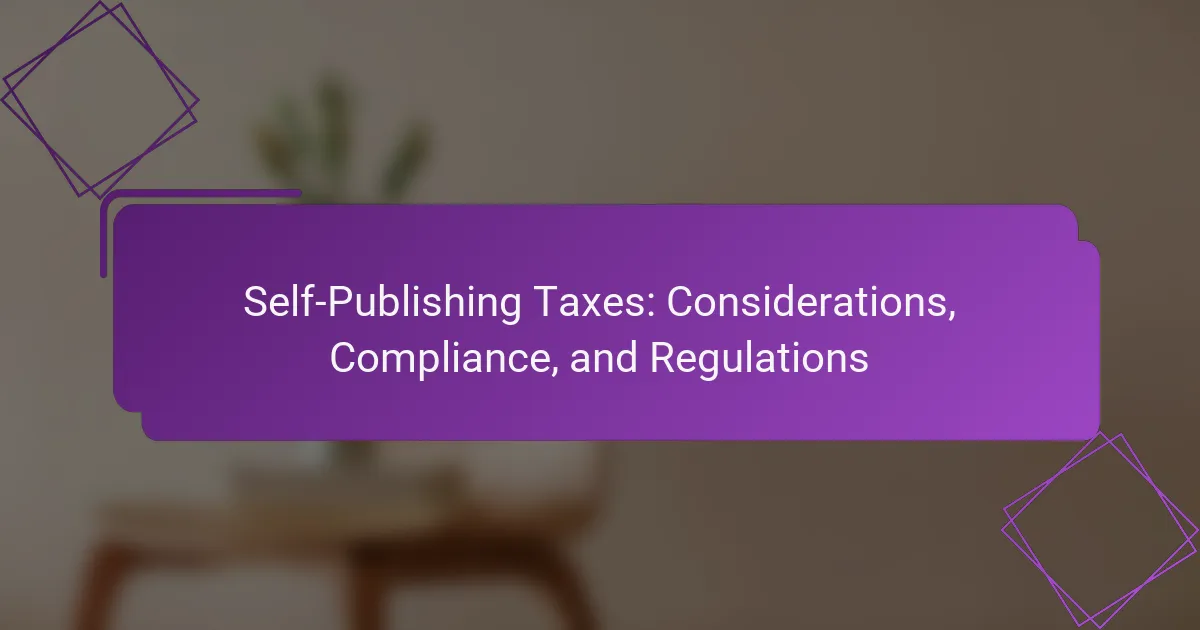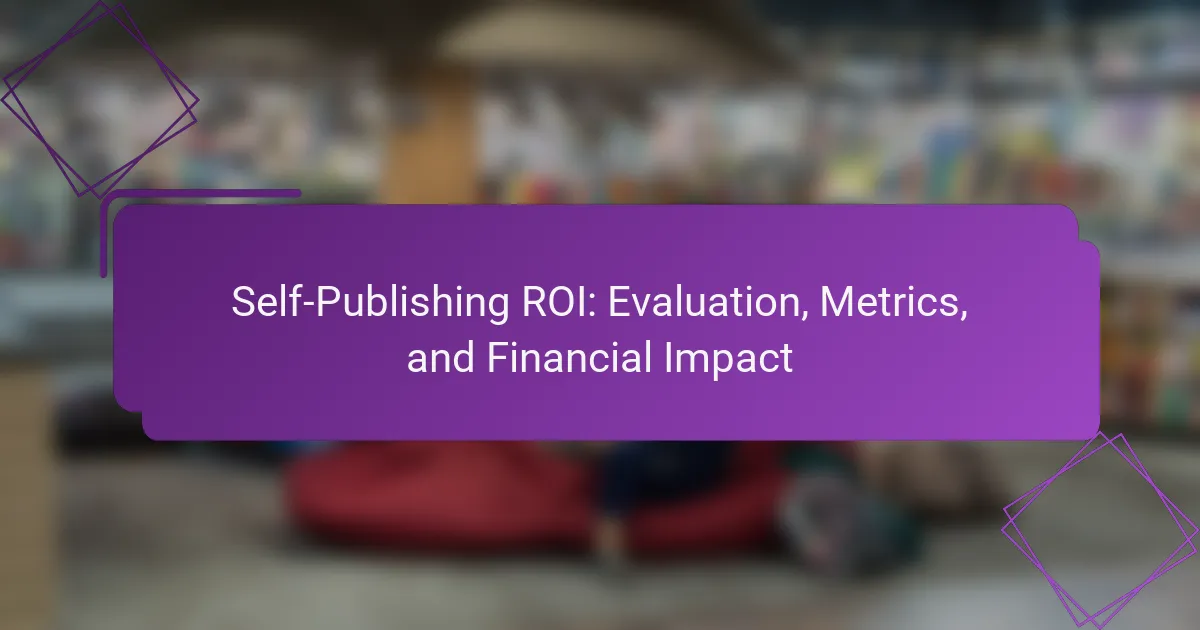Self-publishing authors in the US face unique tax obligations, including income tax on earnings and self-employment tax for those exceeding certain income thresholds. Understanding how to categorize income as business income or royalties is essential for compliance and accurate reporting. Additionally, authors can benefit from various deductions related to their writing and publishing activities, which can help lower their taxable income significantly.
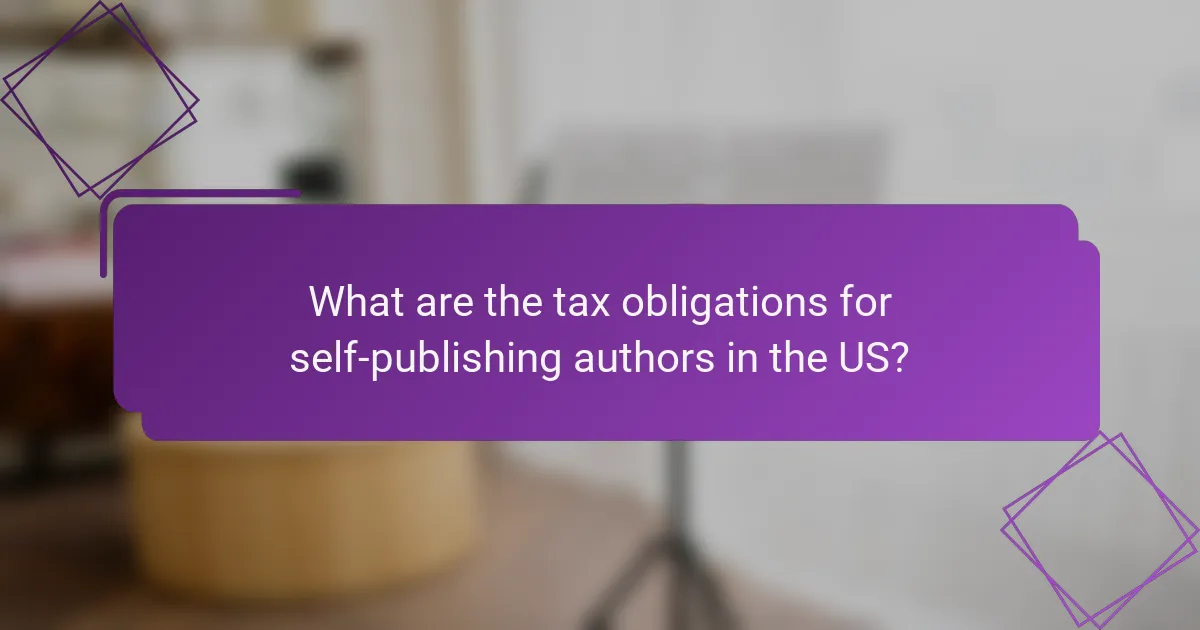
What are the tax obligations for self-publishing authors in the US?
Self-publishing authors in the US have specific tax obligations that include income tax on earnings and self-employment tax if they earn above a certain threshold. Understanding these requirements is crucial for compliance and effective financial planning.
Income tax requirements
Self-publishing authors must report their income on their federal tax returns, typically using Schedule C to detail business income and expenses. This income includes royalties, book sales, and any other earnings related to their publishing activities.
The tax rate for self-publishing income varies based on total taxable income, with rates ranging from 10% to 37%. Authors should keep accurate records of all income and related expenses to maximize deductions and minimize tax liability.
Self-employment tax implications
In addition to income tax, self-publishing authors are subject to self-employment tax on their net earnings, which funds Social Security and Medicare. This tax applies if net earnings exceed $400 in a year.
The self-employment tax rate is approximately 15.3%, which includes both the employer and employee portions of Social Security and Medicare taxes. Authors can deduct half of this tax when calculating their adjusted gross income, providing some relief.
Estimated tax payments
Self-publishing authors may need to make estimated tax payments throughout the year if they expect to owe more than a certain amount in taxes. Generally, if you anticipate owing at least $1,000 in tax after subtracting withholding and refundable credits, estimated payments are required.
These payments are typically made quarterly and can be calculated using IRS Form 1040-ES. Authors should estimate their income and expenses carefully to avoid underpayment penalties and ensure they meet their tax obligations on time.
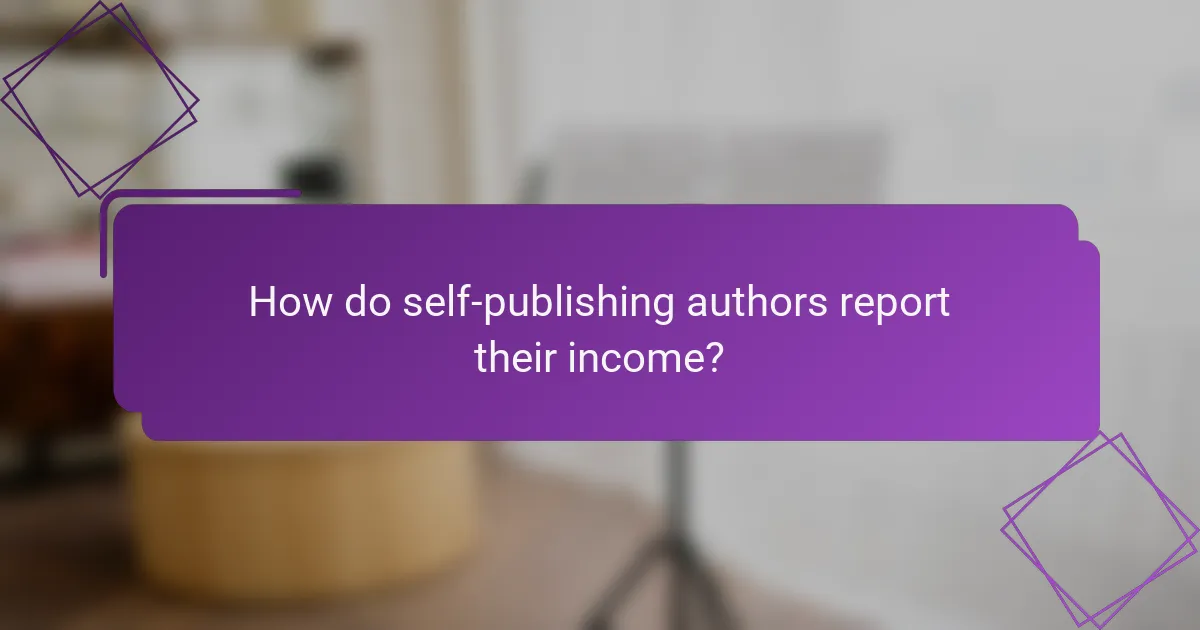
How do self-publishing authors report their income?
Self-publishing authors report their income by categorizing it as business income or royalties, depending on the source. Accurate reporting is crucial for compliance with tax regulations and to avoid potential penalties.
Using Schedule C for business income
Self-publishing authors often use Schedule C to report income earned from selling books directly. This form allows authors to detail their business income and deduct related expenses, such as printing costs, marketing, and software subscriptions.
When filling out Schedule C, it’s important to keep thorough records of all income and expenses. Authors should track sales through platforms like Amazon or their own websites, ensuring they can substantiate their reported figures with receipts and invoices.
Reporting royalties on Form 1099
If self-publishing authors earn royalties from publishers or distributors, they typically receive a Form 1099-MISC or 1099-NEC, depending on the nature of the payments. This form reports the total royalties received, which must be included in the author’s income tax return.
Authors should verify the amounts reported on Form 1099 against their own records. If discrepancies arise, they should contact the issuer to resolve any issues before filing taxes. Keeping a detailed log of all royalty payments can help ensure accuracy and compliance.
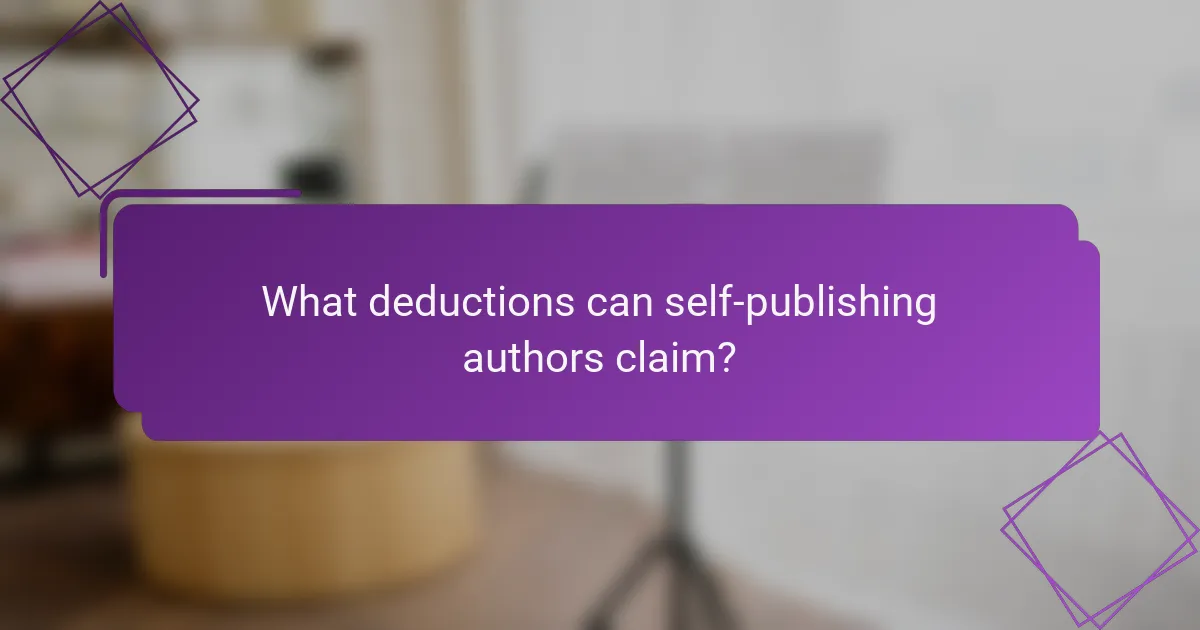
What deductions can self-publishing authors claim?
Self-publishing authors can claim various deductions related to their writing and publishing activities, which can significantly reduce their taxable income. Common deductions include expenses for writing materials, marketing costs, and home office expenses.
Business expenses for writing materials
Authors can deduct costs associated with writing materials, such as books, software, and office supplies. This may include expenses for word processing software, notebooks, and even research materials that contribute to the writing process.
Keep track of receipts and invoices for these purchases, as they will be necessary for tax reporting. If you purchase equipment, like a computer or printer, consider the depreciation over time, which can also be deducted.
Marketing and promotion costs
Marketing and promotion expenses are essential for self-publishing authors and can be fully deductible. This includes costs for advertising, website development, and promotional materials like business cards or flyers.
Additionally, if you attend book fairs or literary events to promote your work, those travel and registration expenses can also be claimed. Document all related expenses to ensure you maximize your deductions.
Home office deduction eligibility
Self-publishing authors may qualify for the home office deduction if they use a specific area of their home exclusively for writing and publishing activities. This deduction can cover a portion of your home-related expenses, such as utilities, internet, and rent or mortgage interest.
To qualify, the space must be used regularly and exclusively for your writing business. Keep detailed records of the square footage of your home office compared to your entire home to calculate the deduction accurately.
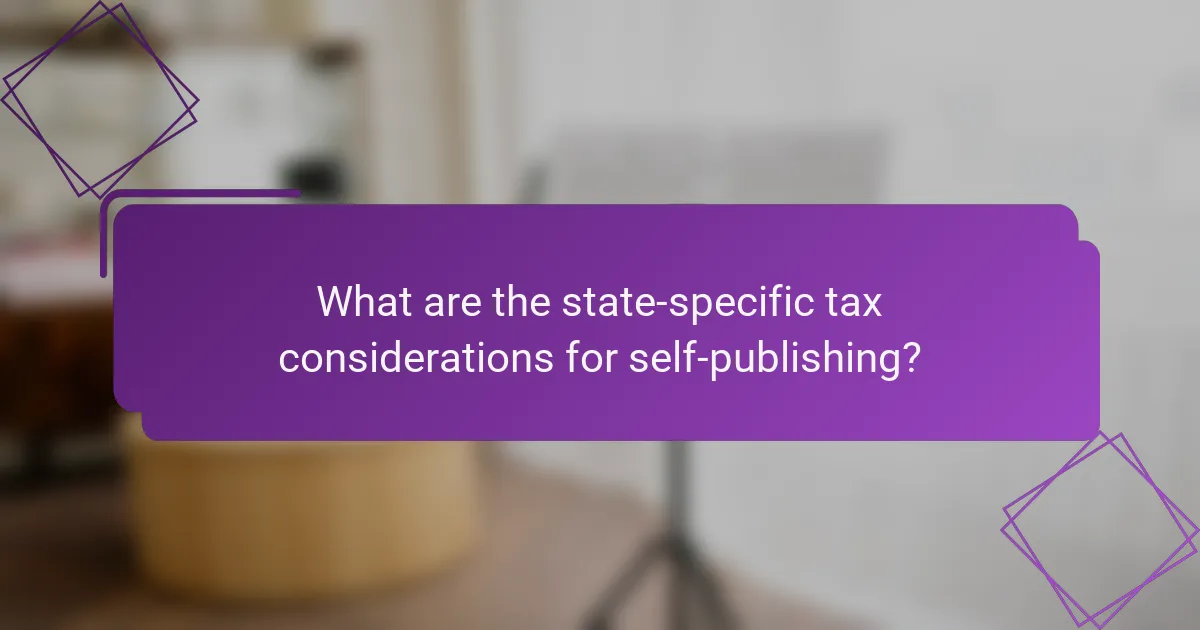
What are the state-specific tax considerations for self-publishing?
Self-publishing involves various state-specific tax considerations that authors must navigate to ensure compliance. Key areas include sales tax on digital products and variations in state income tax obligations, which can significantly affect overall earnings.
Sales tax on e-books in California
In California, e-books are subject to sales tax, which is currently set at 7.25% but can be higher depending on local jurisdictions. Authors need to register for a seller’s permit if their sales exceed a certain threshold, typically around $500 annually.
When selling e-books, it’s crucial to collect sales tax at the point of sale and remit it to the California Department of Tax and Fee Administration. Failure to comply can result in penalties, so maintaining accurate records of sales and taxes collected is essential.
State income tax variations
State income tax obligations for self-published authors vary widely across the United States. Some states, like Florida and Texas, do not impose a state income tax, while others have rates that can reach into the double digits.
Authors should consider their residency status and where their sales occur, as this can affect tax liabilities. It’s advisable to consult with a tax professional familiar with self-publishing to navigate these complexities and ensure compliance with state tax laws.
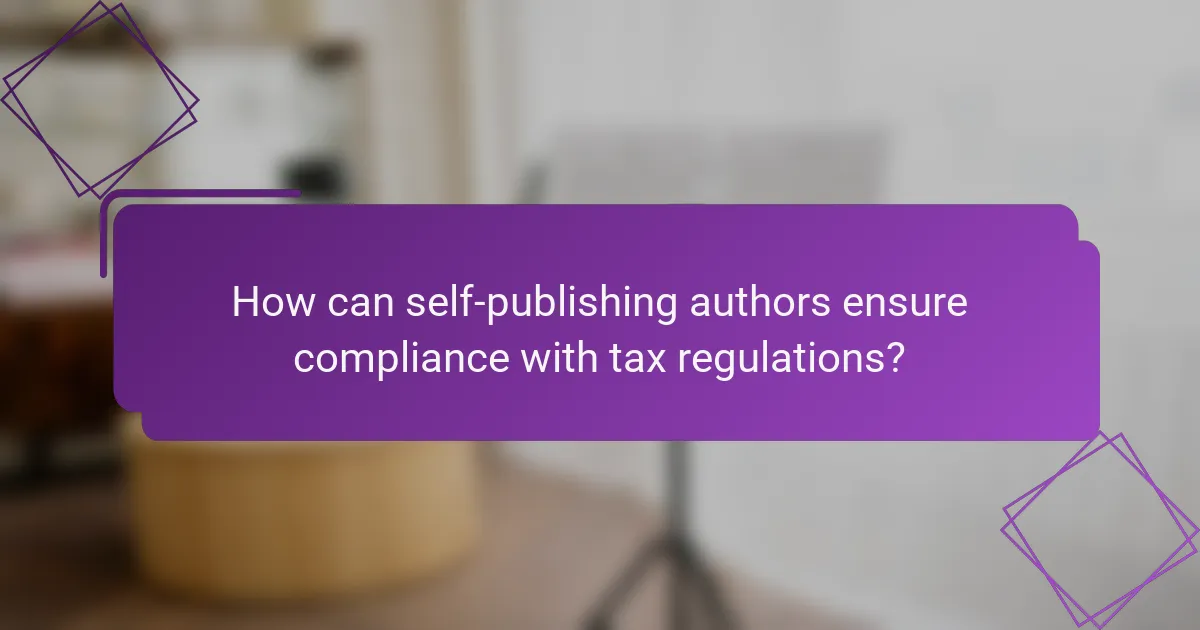
How can self-publishing authors ensure compliance with tax regulations?
Self-publishing authors can ensure compliance with tax regulations by maintaining thorough financial records and seeking guidance from tax professionals. Understanding local tax laws and reporting requirements is crucial for avoiding penalties and optimizing tax obligations.
Maintaining accurate financial records
Accurate financial records are essential for self-publishing authors to track income and expenses related to their work. This includes sales revenue, costs for editing, cover design, marketing, and any other related expenditures. Keeping detailed records can help in calculating taxable income and identifying potential deductions.
Utilizing accounting software or spreadsheets can simplify the process of tracking finances. Authors should categorize their income and expenses clearly, ensuring that all receipts and invoices are organized and accessible for tax filing. Regularly updating these records can prevent last-minute scrambles during tax season.
Consulting with a tax professional
Engaging a tax professional can provide self-publishing authors with tailored advice on compliance with tax regulations. A qualified accountant can help navigate complex tax laws, identify eligible deductions, and ensure accurate reporting. This is particularly important for authors who may have multiple income streams or reside in different tax jurisdictions.
When selecting a tax professional, look for someone with experience in the publishing industry or self-employment tax issues. This expertise can be invaluable in optimizing tax strategies and minimizing liabilities. Authors should also inquire about ongoing support, especially during tax season, to address any emerging questions or concerns.

What are the emerging trends in self-publishing taxes?
Emerging trends in self-publishing taxes reflect the evolving landscape of digital sales and regulatory changes. Authors must stay informed about how these trends impact their tax obligations and compliance strategies.
Impact of digital sales on tax regulations
The rise of digital sales has significantly influenced tax regulations for self-published authors. Many jurisdictions now require sales tax to be collected on e-books and digital content, which can vary by state or country. Authors must understand where their sales occur to comply with local tax laws.
For instance, in the United States, sales tax rules differ by state, with some states exempting digital goods while others impose a tax. Authors should consider using tax software or consulting a tax professional to navigate these complexities effectively.
Changes in tax laws affecting authors
Recent changes in tax laws have introduced new compliance requirements for self-published authors. For example, tax reforms may affect how royalties are taxed, potentially leading to higher tax liabilities. Authors should familiarize themselves with any recent legislation that impacts their earnings.
Additionally, international tax treaties can affect authors who sell their works globally. Understanding these treaties can help authors avoid double taxation and ensure they are paying the correct amount in taxes.
Future of self-publishing and tax compliance
The future of self-publishing will likely see increased scrutiny and regulation regarding tax compliance. As digital sales continue to grow, governments may implement stricter reporting requirements for authors. Staying proactive about tax obligations will be crucial for long-term success.
Authors should consider establishing a routine for tracking income and expenses related to their self-publishing efforts. Regularly reviewing tax obligations and seeking professional advice can help mitigate risks associated with non-compliance and ensure authors are prepared for any future changes in tax law.
